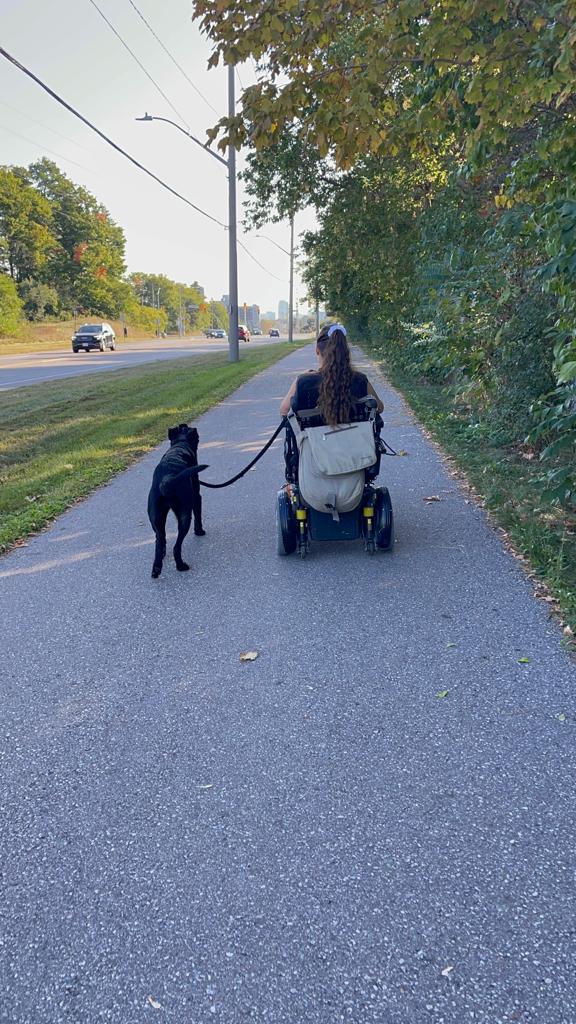A s a result of my internalized ableism, in my effort to make others more comfortable with disability and to minimize inappropriate behaviours, such as staring, I advise, “If you are curious about anything related to disability, just ask me.” Thus, I have inadvertently encouraged initial connections between myself and potential friends to be more like disability awareness interviews than organic friendships. This policy has led to some pretty awkward circumstances. For example, before I go to a casual event like dinner at someone’s house, I am often subjected to a somewhat invasive interview process. People might start by asking something innocuous like, “Can your wheelchair go over one step?” “Will your wheelchair fit through my front door?” or “How wide is your wheelchair?” They often progress to a question such as, “What kind of bowls, plates, and cutlery will you use?” Sometimes they follow up with a question to the effect of, “So how do you go to the bathroom?”
Related: Disability etiquette tips
I appreciate that such questions are typically coming from well-meaning people who want to make friends and are trying to prepare for every circumstance as they reach out, but such questions can feel like too much too fast. Among friends who do not have visible disabilities, personal details are typically revealed more gradually as trust develops over time. Acquaintances are not asked to reveal such details. Better conversation starters may include: “The width of our front door is… Would that work for you to get in with your wheelchair?” “If you need to use the bathroom when you visit our place, let me know what kind of support, if any, you might need.”
Being a good neighbour begets organic friendship
Over several months, I got to know one of my neighbours deeper than most. Through this, I experienced the wisdom of Isaiah 55:8-9. Indeed, God’s ways are higher than our ways and God’s thoughts are higher than our thoughts. I knew that I needed a dog trainer; God knew that through my neighbour, I would be blessed with not only a dog trainer, but also a personal support worker (PSW), housecleaner, and Christian friends/family to share life with. Initially, I hired my neighbour to help train my puppy. This was a good choice. Some dog trainers had little to suggest once they realized I could not implement their training in the same way that other clients might, reflecting their propensity toward individual ableism. In contrast, my dog trainer/neighbour adapted, increasing the frequency of training and taking a much more hands-on role with my dog. As we worked together with my dog more intensively, my neighbour became familiar with my physical limitations as well as my visual ones.
While we were training my dog, my neighbour also witnessed how my PSWs support me to enjoy coffee and other treats. It became natural for my neighbour and I to have coffee together without the support of a PSW. Helping me with this was not something he was “trained” to do. It was something he observed. Having travelled everywhere with my dog and I, my neighbour, who is a fellow board member where we live, began to understand the extent of my visual impairment. From this informed place, he was better able to explain it to others and join me in advocating for materials in electronic format. In the meantime, he reviewed them with me so that I could contribute.
Sometime later, my dog trainer/neighbour invited me over for dinner with his family. Knowing that I would not be able to get in his house, he suggested we eat together in the backyard. When the forecast called for rain, our dinner plans were adapted, and a dining table and chairs were set up in the garage. It was so refreshing that I did not need to make special arrangements to get in the house or answer any questions about special plates, bowls, and cutlery. My neighbour’s family did not need to ask me these kinds of questions because we were adequately familiar with one another by that point.
Related: Changing attitudes toward people with disabilities in the church
Over dinner, I described a little about what my life has been like through the pandemic and the PSW shortage. At that point, his wife offered, “I am interested in being a personal support worker. I don’t have experience yet, but I would be willing to try if you teach me.” I agreed. She is one of the best PSWs I have ever worked with. I think that has something to do with viewing me holistically. We regularly alternate sharing dinner at each other’s houses now. To these neighbours, I am more than a client who is disabled. I am a board member, a neighbour, a friend, and an occasional entertainer of their children.
Among Christians, there is much debate about who is our neighbour and what it means to fulfill the second greatest commandment to love our neighbours as ourselves (Matthew 22:39). I do not believe it is necessary or realistic for everyone to become invested in multiple facets of the life of a neighbour who has disabilities. The point that might be worth remembering is that what my dog trainer/neighbour and his family learned about my life and what I learned about theirs happened very naturally over a period of several months. We grew to love one another as we love ourselves. It was not a goal that either of us set out to accomplish. It is a blessing that was almost unexpected, the result of God working in all our lives.

Chantal Huinink
Chantal Huinink (MSW, RSW, MDiv) is Coordinator of Organizational and Spiritual Life at Christian Horizons, as well as a motivational speaker, author, and social justice advocate. Chantal lives in Kitchener, Ontario, and serves as the regional councillor for the Waterloo region.



